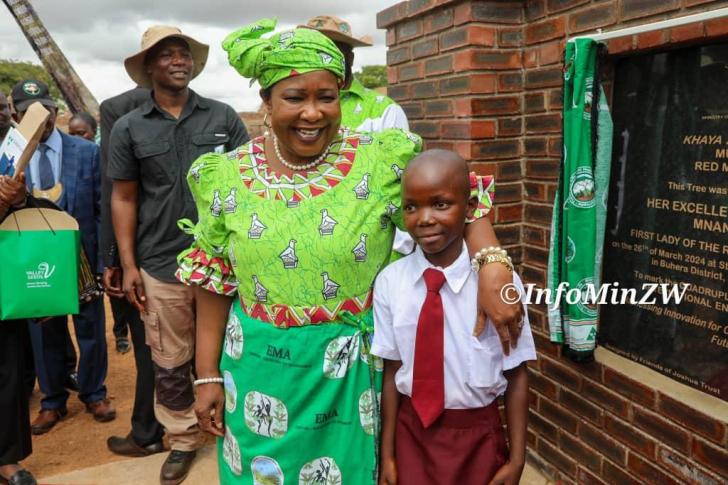News / Local
Mnangagwa's wife cashes in on national dress
19 Jun 2024 at 06:37hrs |
0 Views

First Lady Auxillia Mnangagwa has reportedly been involved in profiting from the sales of Zimbabwe's national dress, a fabric she initiated and promoted, which has become ubiquitous at state and ZANU-PF functions. Investigations revealed that committees established by Auxillia appointed ZANU-PF and the Zimbabwe Tourism Authority (ZTA) as the main retailers of the fabric, which is also available at the First Lady's office.
The national fabric is sold at US$4 per meter at ZTA offices in Harare, significantly higher than the average price of US$1.50 per meter found in shops during a survey. This disparity has raised concerns among prospective buyers who question the steep price and suspect profit motives rather than a genuine effort to promote national pride.
Tourism and Hospitality Industry minister Barbara Rwodzi, who inherited a constituency from Auxillia, has been actively promoting the national dress. When questioned about the pricing, Rwodzi declined to comment, referring inquiries to her personal assistant who also did not provide further information.
ZANU-PF director for information Farai Marapira defended the initiative, stating there has been overwhelming public interest in the national dress as a symbol of national identity, accessible to all Zimbabweans, not just ZANU-PF supporters. He confirmed that ZANU-PF facilitates orders through their commercial arm, the House of Cheneso, to make the dress more accessible to party members.
However, details about where the proceeds from the dress sales are directed remain unclear. While sources from the Tourism ministry suggested proceeds could be going to Auxillia's coffers, this could not be independently verified.
Efforts to obtain official comments from government officials were unsuccessful, with redirections and non-responses to inquiries.
The national dress initiative was launched by the First Lady in April 2020 with the aim of fostering patriotism and national identity among Zimbabweans, endorsed by President Emmerson Mnangagwa. Despite attempts by ZANU-PF legislators to mandate its use in Parliament, the proposal did not gain traction among lawmakers.
Overall, public reception to the national dress has been mixed, with some questioning its significance in national identity-building efforts according to research cited in the article.
The national fabric is sold at US$4 per meter at ZTA offices in Harare, significantly higher than the average price of US$1.50 per meter found in shops during a survey. This disparity has raised concerns among prospective buyers who question the steep price and suspect profit motives rather than a genuine effort to promote national pride.
Tourism and Hospitality Industry minister Barbara Rwodzi, who inherited a constituency from Auxillia, has been actively promoting the national dress. When questioned about the pricing, Rwodzi declined to comment, referring inquiries to her personal assistant who also did not provide further information.
ZANU-PF director for information Farai Marapira defended the initiative, stating there has been overwhelming public interest in the national dress as a symbol of national identity, accessible to all Zimbabweans, not just ZANU-PF supporters. He confirmed that ZANU-PF facilitates orders through their commercial arm, the House of Cheneso, to make the dress more accessible to party members.
Efforts to obtain official comments from government officials were unsuccessful, with redirections and non-responses to inquiries.
The national dress initiative was launched by the First Lady in April 2020 with the aim of fostering patriotism and national identity among Zimbabweans, endorsed by President Emmerson Mnangagwa. Despite attempts by ZANU-PF legislators to mandate its use in Parliament, the proposal did not gain traction among lawmakers.
Overall, public reception to the national dress has been mixed, with some questioning its significance in national identity-building efforts according to research cited in the article.
Source - newsday
Join the discussion
Loading comments…
































